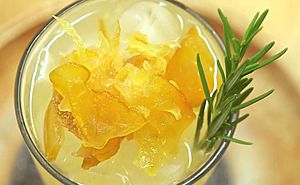Dangyuja facts for kids
Quick facts for kids Dangyuja |
|
|---|---|
| Species | Citrus grandis (L.) Osbeck |
| Origin | Jeju Island |
Dangyuja (Korean: 당유자) is a special citrus fruit from Korea. It grows mainly on Jeju Island. In the local Jeju language, people call it daengyuji (댕유지).
Dangyuja looks and tastes a bit like yuzu. However, it is actually a type of pomelo. This fruit is so unique that it's listed in the Ark of Taste. This is a special list of important heritage foods that are becoming rare.
Contents
What is Dangyuja?
The Dangyuja Tree
The Dangyuja tree is an evergreen tree. This means it stays green all year round. It usually grows to about 6 meters (20 feet) tall. Its branches have thorns, and its leaves are about 10 to 13 centimeters (4 to 5 inches) long.
The Dangyuja Fruit
The fruit itself is quite large. It is usually 10 to 12 centimeters (4 to 5 inches) long and 9 to 10 centimeters (3.5 to 4 inches) wide. Each fruit often weighs between 300 and 500 grams (about 11 to 18 ounces).
When the fruit is ripe, its color can be dark yellow or yellow-orange. The skin is thick, about 9 millimeters (0.35 inches). It smells very nice but tastes a little bitter. The inside of the fruit, the flesh and juice, is very sour. It also has a special, unique smell.
How Dangyuja is Used
In the Kitchen
Today, Dangyuja is mostly used to make a delicious tea called dangyuja-cha. Making this tea is very similar to how people make yuja tea.
In the past, Dangyuja was also used in home remedies. People used it to help prevent and treat the common cold. One special dish was daengyuji-kkul-tang, which means "dangyuja honey soup." This soup was made by crushing the fruit's flesh and mixing it with honey and ginger. It was then cooked in the warm ashes of a fire until it became a thin, syrup-like mixture.
For Health
In traditional Korean medicine, Dangyuja fruit was used to help with different tummy problems. An old medical book from 1613, called Dongui Bogam, mentions Dangyuja. It says the fruit can help clean the stomach and make a poor appetite better.
 | Audre Lorde |
 | John Berry Meachum |
 | Ferdinand Lee Barnett |


